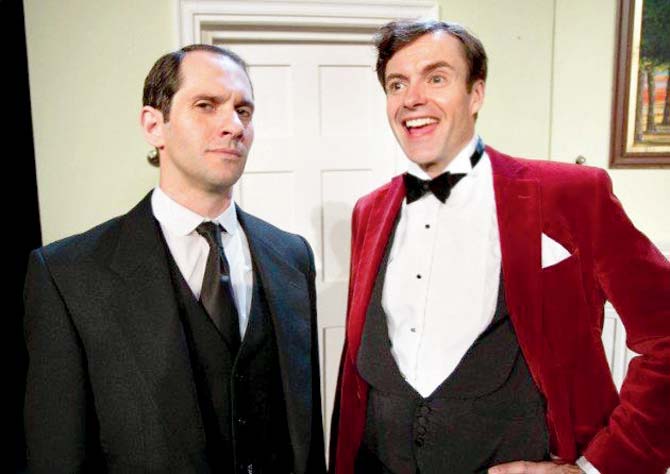Jeeves and Wooster were greeted with an almost full house, but how many were charmed by their upper-class nostalgia?

 There are a couple of generations of ‘English medium’ people whose reading went from Enid Blyton and Biggles to Agatha Christie to PG Wodehouse, diving into a notion of ‘Englishness’ that was conjured up by the imagination — unless, of course, the reader was rich enough to holiday in British castles.
There are a couple of generations of ‘English medium’ people whose reading went from Enid Blyton and Biggles to Agatha Christie to PG Wodehouse, diving into a notion of ‘Englishness’ that was conjured up by the imagination — unless, of course, the reader was rich enough to holiday in British castles.
ADVERTISEMENT

The Olivier-winning West End stage production, Jeeves and Wooster In Perfect Nonsense (directed by David Goodale), got a mixed response in Mumbai
Of Wodehouse’s gloriously funny and charmingly silly novels, the ones featuring Bertie Wooster and his all-purpose valet Jeeves, are the most popular, and of these, The Code Of The Woosters (1938) is arguably the best. It has all the quirky elements that PGW came to known for, as he lampooned idle English aristocracy of the Edwardian era with such wit, that nobody was offended. Far from feeling envious that an idiot like Bertie had it all (including a butler who was so superior in every way that it’s surprising that he didn’t quit or poison his boss), the reader revels in that world of wealth, leisure and entitlement.
Now, there are a whole lot of people who have never heard of Wodehouse or read his books. If there are still some Wodehouse fans, there are also enough who have outgrown that brand of humour.
A television series Jeeves and Wooster introduced a new set of readers to PGW, but how many outside of the UK would still be enchanted by upper class nostalgia is debatable.
Which is perhaps why, the Olivier-winning West End stage production, directed by David Goodale — Jeeves and Wooster In Perfect Nonsense — that travelled to Mumbai last week, got a mixed response. The houses, despite the high ticket prices, were almost full. Many in the audience enjoyed the play, but quite a few viewers were disappointed by it too.
If a section of the audience hadn’t read The Code Of The Woosters (or any other PGW book) they wouldn’t know what the hell was going on. There was a lot of energy on stage, but the main thing about Wodehouse’s books is the prose, and just a little of that was used, amidst all the slapstick goings-on.
Charlotte Jones, writing in The Guardian about the book encapsulated it perfectly. “Bertie Wooster and his “gentleman’s personal gentleman” Jeeves must reconcile newt-obsessed Gussie Fink-Nottle with “droopy, blonde, saucer-eyed” Madeline Bassett; help Aunt Dahlia to deprive Sir Watkyn Bassett of an antique silver cow-creamer; unite Stiffy Byng and her secret lover, local curate and Bertie’s old school friend ‘Stinker’ Pinker; and thwart the violent inclinations of Sir Roderick Spode by uncovering the mysterious ‘Eulalie’. There’s also the requisite theft of a policeman’s helmet. The Code Of The Woosters pushes Wodehouse’s trademark convoluted plotting to the limit; Bertie has been in the soup before, but, as he says to Jeeves at the beginning of the story, “this one wins the mottled oyster.”
Not much of this plot lunacy comes across on stage, but there is such speed and efficiency with which sets are moved and costumes changed, that the viewer is more entranced by the ‘how’ of the action more than the ‘what’ or ‘why’.
Bertie Wooster (a wonderful Matthew Carter) stays constant, while the other two actors (Joseph Chance and Robert Goodale) play multiple parts, and even though their timing is impeccable, sometimes the very cleverness slows the action down. For instance, Bertie is so terrified of Sir Roderick Spode, that he imagines him to be nine feet tall. So every time Spode appears on stage, he is somehow elevated, and the gag falls flat the second time.
There is the truly delightful scene of Bertie in a bathtub, thrilled with the rubber duck he finds in it, and the deftness with which Jeeves helps him out and into his robe without any show of, err, skin.
The style of the production has been compared to Michael Frayn’s cyclonic backstage farce, Noises Off. There are also similarities to Steven Canny and John Nicholson’s spoof of Arthur Conan Doyle’s The Hounds of The Baskevilles (a local production directed by Akash Khurana).
It’s a play-within-a-play setting in which Wooster has hired a West End theatre to put on a dramatised version of the episode involving his Aunt Dahlia, an antique cow creamer and a crazy night spent at the country estate of his short-sighted friend Gussie, which also involves scary (for Bertie) encounters with Madeline and Stiffy (with her vicious terrier) — PGW’s women are invariably terrifying and seen as a threat to the easy lives the young men lead.
PGW fans ‘got’ it because they were filling in their own blanks. But it’s hardly likely that the production would make a dent in the sale of his books. (The title of this piece comes from a Wooster-Jeeves exchange that goes: “You agree with me that the situation is a lulu?” “Certainly, a somewhat sharp crisis in your affairs would appear to have been precipitated, Sir.” )
However, the company, Blank Slate, that brought down the show, deserve applause for daring, and perhaps, opening up the Indian market for bigger international productions. Worth looking forward to is the legendary Peter Brook’s new production Battlefield coming to Mumbai in March, just a few months after it opened in Paris.
Deepa Gahlot is an award-winning film and theatre critic and an arts administrator. She tweets at @deepagahlot
 Subscribe today by clicking the link and stay updated with the latest news!" Click here!
Subscribe today by clicking the link and stay updated with the latest news!" Click here!






